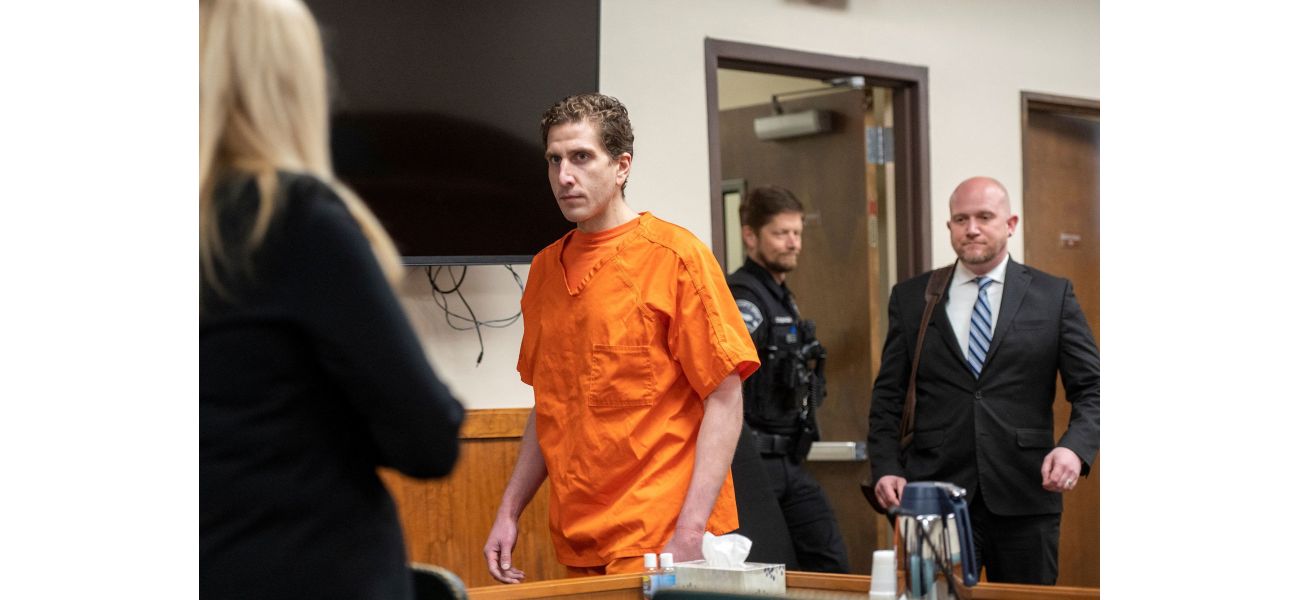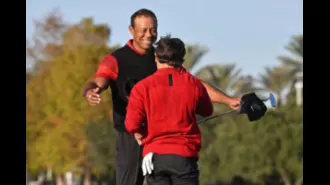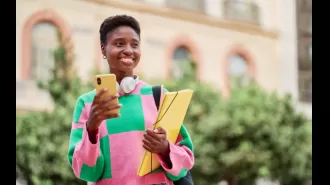A US judge has allowed prosecutors to pursue death penalty against a suspect in the murder of four college students.
Judge allows death penalty to be pursued against Bryan Kohberger, accused of 2022 murders of 4 University of Idaho students in off-campus home.
November 21st 2024.

A US judge has recently made a ruling that prosecutors can continue pursuing the death penalty against Bryan Kohberger, the man accused of killing four University of Idaho students in their off-campus home in 2022. This decision has been one of the latest developments leading up to the trial, which is set to begin in June 2025.
It's been a long and winding road since the tragic stabbing of four students – Kaylee Goncalves, Ethan Chapin, Xana Kernodle, and Madison Mogen – on November 13, 2022, at a home just off the main campus in Moscow, Idaho. The accused, Kohberger, a Washington State University graduate student in criminology, was arrested on December 30, 2022, in his home state of Pennsylvania. He was charged with four counts of murder and entered a not-guilty plea on his behalf in May 2023, with his attorneys stating that the 29-year-old plans to present an alibi in his defence.
However, the case has been progressing at a slow pace due to a series of pre-trial motions and hearings. These have caused frustration for the family of one of the victims as well as the judge overseeing the case. The hearings have mainly focused on three different areas, including the defence attorneys' access to evidence, specifically the use of investigative genetic genealogy by the prosecution in building their case. Another aspect has been Kohberger's proposed alibi, and finally, there has been a series of hearings related to a gag order limiting public discussion of the case.
Below is a timeline of the notable pre-trial developments and decisions so far:
June 9, 2023: A coalition of media organizations and the family of one of the victims challenged the gag order placed on the parties in the case in court.
June 23, 2023: The judge denied both requests but issued a revised gag order, allowing the parties to discuss topics that do not have a "substantial likelihood of materially prejudicing or otherwise influencing the outcome of the case".
August 2, 2023: Kohberger's attorneys stated that they would use an alibi defence, but they could not pinpoint their client's specific location on the night of the killings as he was driving during the late night and early morning hours.
October 26, 2023: The judge denied a request to dismiss the grand jury indictment after the defence argued there was an error in the grand jury instructions.
December 18, 2023: The judge denied a second motion to dismiss the indictment after the defence claimed that prosecutors failed to comply fully with state rules on jury selection and the jury questionnaire.
February 28, 2024: The defence requested to allow three experts and others to view the investigative genetic genealogy evidence, which has been sealed, to understand how police focused on Kohberger as a suspect. The judge initially declined to give them extended access, stating that he would rather the already approved experts justify the need to dig deeper.
April 4, 2024: The judge criticized Kohberger's defence attorney for conducting phone surveys with potential jurors, which could potentially hinder his ability to receive a fair trial. However, the defence argued that the judge violated Kohberger's right to due process by ordering a stop to the anonymous survey without hearing their side first.
April 17, 2024: Kohberger's defence lawyers filed a document stating that they plan to provide a cell phone tower and radio frequency expert to partially corroborate their client's proposed alibi that he was driving west of Moscow on the night of the killings.
April 19, 2024: The judge allowed surveys conducted with potential jurors to continue without modification after temporarily pausing them.
April 29, 2024: The prosecution requested the court to deny Kohberger the opportunity to add to his alibi and prevent anyone other than the defendant from testifying about his whereabouts on the night of the murders.
May 2, 2024: The defence requested for an upcoming evidentiary hearing with witnesses to be made public, while the prosecution asked for it to be sealed. The judge ruled that the hearing will be closed to the public.
After the hearing, the family of victim Goncalves criticized the slow pace of the proceedings, stating that it has turned into a hamster wheel of motions, hearings, and delayed decisions, adding that they are incredibly frustrated.
May 23, 2024: The defence attorney questioned a Moscow police detective about the preparation of visual cell phone logs and methods for searching for specific videos. This testimony was related to two motions to compel prosecutors to share evidence with the defence, but the contents of the motions are sealed, making it unclear what they were requesting.
May 30, 2024: The Moscow police detective leading the investigation and a defence expert in cell phone location data testified that the defence has not received some key evidence in the case. The lead investigator, Brett Payne, stated that they collected thousands of hours of video surveillance in their search for a white Hyundai Elantra connected to the suspect, but there is no central inventory of the videos. He also said that none of the videos showed the Elantra heading south from Moscow towards Pullman, Washington, in the early hours after the killings. However, the probable cause affidavit used in the case alleges that Kohberger drove south towards Pullman after committing the four murders.
After careful consideration, a US judge has ruled that prosecutors can continue to pursue the death penalty against Bryan Kohberger. Kohberger is the man accused of fatally stabbing four University of Idaho students in their off-campus home back in 2022. This decision was made amidst a flurry of developments leading up to the trial, which is set to begin in June 2025.
It's been a long and winding road since the tragic deaths of Kaylee Goncalves, Ethan Chapin, Xana Kernodle, and Madison Mogen. These four students were stabbed in their home on November 13, 2022, located near the main campus in Moscow, Idaho. The suspect, Kohberger, was arrested on December 30, 2022, in his home state of Pennsylvania. He was charged with four counts of murder and entered a not-guilty plea in May 2023. His defense attorneys have revealed that the 29-year-old plans to present an alibi in his defense.
However, the progression of the case has been hindered by several pre-trial motions and hearings, causing frustration for the victims' families and the judge presiding over the case. These hearings have mainly focused on three different areas. The first being the defense's access to evidence, specifically regarding the prosecution's use of investigative genetic genealogy in building their case. The second set of hearings revolve around Kohberger's proposed alibi for his innocence. And the third has been related to a gag order that limits what the parties can publicly disclose about the case.
Here's a timeline of some of the significant pre-trial developments and decisions thus far:
June 9, 2023: Several media organizations and one of the victim's families challenged the gag order placed on the parties involved in the case. However, their requests were denied by Latah County Judge John Judge. Instead, he issued a revised gag order that allows the parties to discuss certain topics that would not influence the outcome of the case.
August 2, 2023: Kohberger's attorneys announced that they would be using an alibi defense. However, they were unable to provide a specific location for their client on the night of the killings, as he was supposedly driving during those hours.
October 26, 2023: The defense requested that the grand jury indictment be dismissed due to an error in the jury instructions. This motion was denied by the judge.
December 18, 2023: The defense made another motion to dismiss the indictment, this time arguing that the prosecutors did not fully comply with state rules on jury selection and the jury questionnaire. This request was also denied by the judge.
February 28, 2024: Defense attorney Anne C. Taylor asked the court to allow three experts and others to view the sealed investigative genetic genealogy evidence. This request was made to understand the full timeline of how the police began to focus on Kohberger. The judge initially declined this request but later agreed to let the approved experts view the material.
April 4, 2024: The judge criticized Kohberger's defense attorney for commissioning phone surveys to potential jurors, which could potentially harm his chances of getting a fair trial. However, the defense argued that the judge violated their client's right to due process by ordering a stop to the anonymous survey without hearing their side first.
April 17, 2024: Kohberger's defense lawyers filed a document stating their intention to offer a cell phone tower and radio frequency expert to partially corroborate their client's alibi. The defense claims that Kohberger was driving west of Moscow on the night of the slayings.
April 19, 2024: The judge allowed surveys conducted with potential jurors to continue without modification, after temporarily pausing them.
April 29, 2024: The prosecution requested that Kohberger not be allowed to add to his alibi and that only he can testify as to his whereabouts on the night of the killings.
May 2, 2024: The defense requested that an upcoming evidentiary hearing with witnesses be made public, while the prosecution wanted it to be sealed. The judge ultimately ruled that it would be closed to the public.
After the hearing, the family of one of the victims, Kaylee Goncalves, expressed their frustration with the slow pace of the proceedings. They said, "This case is turning into a never-ending cycle of motions, hearings, and delayed decisions." They added that they were "incredibly frustrated."
May 23, 2024: Defense attorney Taylor questioned a Moscow police detective about the preparation of visual cell phone logs and the methods used to search for specific videos. This testimony was related to two motions to compel prosecutors to share discovery with the defense. However, the contents of the motions were sealed, so it was unclear what they were requesting.
May 30, 2024: The lead investigator on the case, Brett Payne, testified that the defense had not yet received some crucial evidence in the case. He also stated that the investigators had collected thousands of hours of video surveillance in their search for a white Hyundai Elantra connected to the suspect. However, there is no central inventory of these videos, making it challenging to locate them. Additionally, none of the videos showed the Elantra heading south from Moscow towards Pullman, Washington, on the night of the killings. This contradicts the probable cause affidavit used in the case, which alleges that Kohberger was driving south towards Pullman after the murders.
As the case continues to unfold, the judge has emphasized the importance of cleaning up the legal proceedings and holding regular hearings to avoid further delays. However, with the trial still several years away, it seems that the families of the victims will have to wait even longer for justice to be served.
It's been a long and winding road since the tragic stabbing of four students – Kaylee Goncalves, Ethan Chapin, Xana Kernodle, and Madison Mogen – on November 13, 2022, at a home just off the main campus in Moscow, Idaho. The accused, Kohberger, a Washington State University graduate student in criminology, was arrested on December 30, 2022, in his home state of Pennsylvania. He was charged with four counts of murder and entered a not-guilty plea on his behalf in May 2023, with his attorneys stating that the 29-year-old plans to present an alibi in his defence.
However, the case has been progressing at a slow pace due to a series of pre-trial motions and hearings. These have caused frustration for the family of one of the victims as well as the judge overseeing the case. The hearings have mainly focused on three different areas, including the defence attorneys' access to evidence, specifically the use of investigative genetic genealogy by the prosecution in building their case. Another aspect has been Kohberger's proposed alibi, and finally, there has been a series of hearings related to a gag order limiting public discussion of the case.
Below is a timeline of the notable pre-trial developments and decisions so far:
June 9, 2023: A coalition of media organizations and the family of one of the victims challenged the gag order placed on the parties in the case in court.
June 23, 2023: The judge denied both requests but issued a revised gag order, allowing the parties to discuss topics that do not have a "substantial likelihood of materially prejudicing or otherwise influencing the outcome of the case".
August 2, 2023: Kohberger's attorneys stated that they would use an alibi defence, but they could not pinpoint their client's specific location on the night of the killings as he was driving during the late night and early morning hours.
October 26, 2023: The judge denied a request to dismiss the grand jury indictment after the defence argued there was an error in the grand jury instructions.
December 18, 2023: The judge denied a second motion to dismiss the indictment after the defence claimed that prosecutors failed to comply fully with state rules on jury selection and the jury questionnaire.
February 28, 2024: The defence requested to allow three experts and others to view the investigative genetic genealogy evidence, which has been sealed, to understand how police focused on Kohberger as a suspect. The judge initially declined to give them extended access, stating that he would rather the already approved experts justify the need to dig deeper.
April 4, 2024: The judge criticized Kohberger's defence attorney for conducting phone surveys with potential jurors, which could potentially hinder his ability to receive a fair trial. However, the defence argued that the judge violated Kohberger's right to due process by ordering a stop to the anonymous survey without hearing their side first.
April 17, 2024: Kohberger's defence lawyers filed a document stating that they plan to provide a cell phone tower and radio frequency expert to partially corroborate their client's proposed alibi that he was driving west of Moscow on the night of the killings.
April 19, 2024: The judge allowed surveys conducted with potential jurors to continue without modification after temporarily pausing them.
April 29, 2024: The prosecution requested the court to deny Kohberger the opportunity to add to his alibi and prevent anyone other than the defendant from testifying about his whereabouts on the night of the murders.
May 2, 2024: The defence requested for an upcoming evidentiary hearing with witnesses to be made public, while the prosecution asked for it to be sealed. The judge ruled that the hearing will be closed to the public.
After the hearing, the family of victim Goncalves criticized the slow pace of the proceedings, stating that it has turned into a hamster wheel of motions, hearings, and delayed decisions, adding that they are incredibly frustrated.
May 23, 2024: The defence attorney questioned a Moscow police detective about the preparation of visual cell phone logs and methods for searching for specific videos. This testimony was related to two motions to compel prosecutors to share evidence with the defence, but the contents of the motions are sealed, making it unclear what they were requesting.
May 30, 2024: The Moscow police detective leading the investigation and a defence expert in cell phone location data testified that the defence has not received some key evidence in the case. The lead investigator, Brett Payne, stated that they collected thousands of hours of video surveillance in their search for a white Hyundai Elantra connected to the suspect, but there is no central inventory of the videos. He also said that none of the videos showed the Elantra heading south from Moscow towards Pullman, Washington, in the early hours after the killings. However, the probable cause affidavit used in the case alleges that Kohberger drove south towards Pullman after committing the four murders.
After careful consideration, a US judge has ruled that prosecutors can continue to pursue the death penalty against Bryan Kohberger. Kohberger is the man accused of fatally stabbing four University of Idaho students in their off-campus home back in 2022. This decision was made amidst a flurry of developments leading up to the trial, which is set to begin in June 2025.
It's been a long and winding road since the tragic deaths of Kaylee Goncalves, Ethan Chapin, Xana Kernodle, and Madison Mogen. These four students were stabbed in their home on November 13, 2022, located near the main campus in Moscow, Idaho. The suspect, Kohberger, was arrested on December 30, 2022, in his home state of Pennsylvania. He was charged with four counts of murder and entered a not-guilty plea in May 2023. His defense attorneys have revealed that the 29-year-old plans to present an alibi in his defense.
However, the progression of the case has been hindered by several pre-trial motions and hearings, causing frustration for the victims' families and the judge presiding over the case. These hearings have mainly focused on three different areas. The first being the defense's access to evidence, specifically regarding the prosecution's use of investigative genetic genealogy in building their case. The second set of hearings revolve around Kohberger's proposed alibi for his innocence. And the third has been related to a gag order that limits what the parties can publicly disclose about the case.
Here's a timeline of some of the significant pre-trial developments and decisions thus far:
June 9, 2023: Several media organizations and one of the victim's families challenged the gag order placed on the parties involved in the case. However, their requests were denied by Latah County Judge John Judge. Instead, he issued a revised gag order that allows the parties to discuss certain topics that would not influence the outcome of the case.
August 2, 2023: Kohberger's attorneys announced that they would be using an alibi defense. However, they were unable to provide a specific location for their client on the night of the killings, as he was supposedly driving during those hours.
October 26, 2023: The defense requested that the grand jury indictment be dismissed due to an error in the jury instructions. This motion was denied by the judge.
December 18, 2023: The defense made another motion to dismiss the indictment, this time arguing that the prosecutors did not fully comply with state rules on jury selection and the jury questionnaire. This request was also denied by the judge.
February 28, 2024: Defense attorney Anne C. Taylor asked the court to allow three experts and others to view the sealed investigative genetic genealogy evidence. This request was made to understand the full timeline of how the police began to focus on Kohberger. The judge initially declined this request but later agreed to let the approved experts view the material.
April 4, 2024: The judge criticized Kohberger's defense attorney for commissioning phone surveys to potential jurors, which could potentially harm his chances of getting a fair trial. However, the defense argued that the judge violated their client's right to due process by ordering a stop to the anonymous survey without hearing their side first.
April 17, 2024: Kohberger's defense lawyers filed a document stating their intention to offer a cell phone tower and radio frequency expert to partially corroborate their client's alibi. The defense claims that Kohberger was driving west of Moscow on the night of the slayings.
April 19, 2024: The judge allowed surveys conducted with potential jurors to continue without modification, after temporarily pausing them.
April 29, 2024: The prosecution requested that Kohberger not be allowed to add to his alibi and that only he can testify as to his whereabouts on the night of the killings.
May 2, 2024: The defense requested that an upcoming evidentiary hearing with witnesses be made public, while the prosecution wanted it to be sealed. The judge ultimately ruled that it would be closed to the public.
After the hearing, the family of one of the victims, Kaylee Goncalves, expressed their frustration with the slow pace of the proceedings. They said, "This case is turning into a never-ending cycle of motions, hearings, and delayed decisions." They added that they were "incredibly frustrated."
May 23, 2024: Defense attorney Taylor questioned a Moscow police detective about the preparation of visual cell phone logs and the methods used to search for specific videos. This testimony was related to two motions to compel prosecutors to share discovery with the defense. However, the contents of the motions were sealed, so it was unclear what they were requesting.
May 30, 2024: The lead investigator on the case, Brett Payne, testified that the defense had not yet received some crucial evidence in the case. He also stated that the investigators had collected thousands of hours of video surveillance in their search for a white Hyundai Elantra connected to the suspect. However, there is no central inventory of these videos, making it challenging to locate them. Additionally, none of the videos showed the Elantra heading south from Moscow towards Pullman, Washington, on the night of the killings. This contradicts the probable cause affidavit used in the case, which alleges that Kohberger was driving south towards Pullman after the murders.
As the case continues to unfold, the judge has emphasized the importance of cleaning up the legal proceedings and holding regular hearings to avoid further delays. However, with the trial still several years away, it seems that the families of the victims will have to wait even longer for justice to be served.
[This article has been trending online recently and has been generated with AI. Your feed is customized.]
[Generative AI is experimental.]
0
0
Submit Comment





